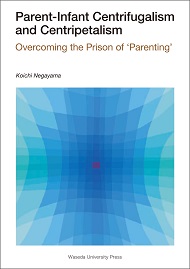
ホーム > English Titles, 新刊案内, 社会・教育, 電子書籍 > Parent-Infant Centrifugalism and Centripetalism
 |
かつては子どもが求めても、親の愛情は部分的にしか満たされなかった。だが少子化・家事の省力化が進んだ現代、母が子の要求をすべて満たせば愛情の過剰摂取になりかねない。動物行動学とフィールド研究が教える、ほどよいヒトの子育てのかたちとは。発達行動学の権威が全編英語でつづる。
【出版社から】
When purchasing Kindle Edition from overseas
→ https://www.amazon.com/dp/B09X552HKR/
この書籍には紙版もございます。ご購入は全国書店およびAmazonなどのネット書店にて承っております。
Professor Emerita of Developmental Ethology at Waseda University.
His research focuses on the adaptive function of negativity between mothers and infants. He originally developed his ideas from a species comparison of primate mother-infant relationships. Special attention has been paid to Kowakare, the process of weaning by mother-infant repulsion, and allomothering by the system of objects, people, and institutions. He is also interested in the balance of centrifugalism and centripetalism between parents and infants in different cultures including remote islands of Okinawa and Scotland. Parent-infant symbiosis and their co-regulation embodied in everyday parent-child interactions of request, acceptance, rejection, and distancing are essential research topics for him.
Preface
Chapter 1 Not in terms of love alone: Animal research and the mother-offspring relationship
Chapter 2 Kowakare = ‘Push’ centrifugalism: When parent and offspring oppose one another
Chapter 3 Human ‘kowakare challenges’: Conflicts surrounding eating and sleeping
Chapter 4 Allomothering = ‘Pull’ centrifugalism: Its evolution and development
Chapter 5 Human allomothering: Mothers aren’t the only ones who raise children
Chapter 6 The centrifugalism embedded in centripetalism: Its conflict and integration
Chapter 7 From parenting to KOSODATE: A comprehensive summary
References
Index


